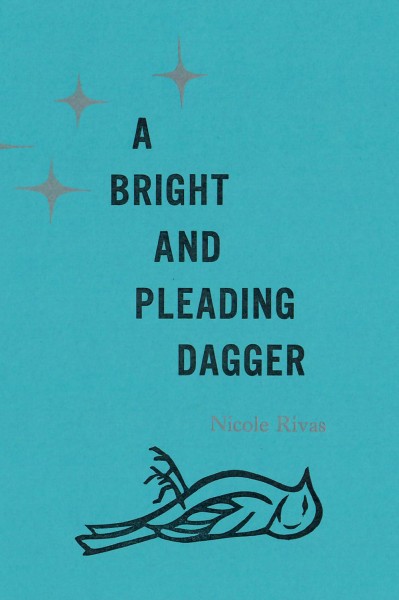
Review by Julia Tagliere
Each year since 2007, Rose Metal Press holds its Short Short Chapbook Contest, which the press’s founders describe as a way “to showcase one of our favorite forms in a format more typically used for poetry than for prose.” The winning 2018 entry is A Bright and Pleading Dagger by Nicole Rivas, an L.A.-based writer whose work has appeared in such publications as Passages North, The Adroit Journal, and Paste Magazine.
In his thoughtful introduction, poet Rigoberto González lauds Rivas for her “skillful use of compression,” noting how this collection places a “finger on the pressure point” of “‘what girls’ lives do or do not depend on’” (a quote from the book’s title piece).
While what women’s lives depend on can readily be seen as an underlying theme, one might argue that Rivas’s tense, clipped pieces don’t so much place a finger on pressure points, as they do create the impression of a battle-scarred warrior, pointing out each of her wounds with a dispassionate finger, sharing her “war” experiences with other, equally-scarred veterans of life as a woman today.
It is to González’s credit that he recognized Rivas’s theme and the emotional impact of her intense pieces, but it is, perhaps, a different experience for a woman to read them. Each piece, in Rivas’s blunt, matter-of-fact, almost terse style, focuses on experiences many women will recognize all too well:
There is, for example, the ever-present sense of danger inherent in a woman’s vulnerability that permeates the title piece, “A Bright and Pleading Dagger,” in which a teenaged narrator and her friend hitch a ride with two older men. When her friend disappears into a cornfield with one of them, the narrator is left alone with the other: “The belt buckle moved faster. I could hear it tapping against the steering wheel, just like his knuckles had done before. While I knew knuckles belonged to a hand, the penis to a pelvis, it didn’t matter. In the truck, the penis had the presence of a closed fist.”
Rivas reminds the reader that it is not only men who take advantage of that vulnerability; sometimes, it’s other women, as in the startling “Death of an Ortolan,” which originally appeared in Passages North: “On my first date with Penny, I was very nervous because I was only nineteen and Penny was fifty-two.” Penny is the narrator’s gynecologist, too—is there any more vulnerable position for a woman to be in, than in those stirrups? Still, their relationship continues: “I was so nervous, because this was only the third date with a woman I’d ever been on, let alone a gynecologist, my gynecologist, and it was a good thing those napkins were cloth, or else I would’ve ripped them to shreds all over again.” And yet, younger, inexperienced, and vulnerable, the narrator falls under the older woman’s sway.
Few experiences of modern womanhood escape inclusion here. There is the young girl with the heart of a lion in “Bulldog,” who dreams of being strong and fierce, but whose mother—her mother—only laughs at her dreams: “She apologized for laughing, but I had already started the water and didn’t answer. In the shower I made some promises to myself about who I was and who I would always be.”
There is the richly satisfying title character in “The Butcher”: “When no one is watching, she works with bare hands, cleaning chicken carcasses and extracting lolling tongues from cow heads…To the butcher, the inside of a hog’s rib cage is much like the beauty of a vacant skyscraper stairwell. She drums her fingers against each rib like a child running up the steps two at a time.” Her work, her joy, and her passion, are full of blood and warmth and offal, she’s up to her elbows in life and death itself, yet she hides that part away; it’s hard not to draw a parallel here, given how much discomfort any talk of women and bleeding in general can generate for some people.
There is Gretel, dreaming of escaping her life with Hansel in the poignant re-imagining of “Gretel’s Escape”: “She watched Hansel poking into the can with his pinky finger. She was tired of being simultaneously lost and bound to fate. Gretel wanted to do something before she was forced to wit her way out of death by cannibalism, something just for her. Only Gretel knew what that was.”
There is also the entertaining heroine in “The Woman on the Bus,” sharing her painfully familiar experience of being the captive audience of a self-important man: “You become silently infuriated, a simmer bordering on boil. He’s grabbed your attention with his remark about the woman he met on the bus…and now that he has your attention, he forces you—either intentionally or unintentionally—to endure the spectacle of his mastication.”
It may sound to this point that perhaps Rivas has it in for men in general, but that would not be a fair assessment at all. Rather, this sharp, chest-tightening collection draws on what are, sadly, familiar and heart-breakingly common experiences for many women. Rivas shares those in the tight, gristly, almost detached prose of a warrior pointing to each scar as proof of having survived that particular battle. Those who would avert their eyes from those scars, who would prefer to remain oblivious to the battles fought and the pain experienced, probably will not find what they’re looking for in this steely little book. For others, it’s a chance to find a bit of solidarity, and perhaps a bit of enlightenment, too.
_________________________
 Julia Tagliere is a writer and editor whose work has appeared in The Writer, The Bookends Review, Potomac Review, numerous anthologies, and the juried photography and prose collection Love + Lust. Winner of the 2015 William Faulkner Literary Competition for Best Short Story and the 2017 Writers Center Undiscovered Voices Fellowship, Julia currently resides in Maryland with her family, where she recently completed her M.A. in Writing at John Hopkins University. She serves as an editor with The Baltimore Review and is currently working on her next novel, The Day the Music Didn’t Die.
Julia Tagliere is a writer and editor whose work has appeared in The Writer, The Bookends Review, Potomac Review, numerous anthologies, and the juried photography and prose collection Love + Lust. Winner of the 2015 William Faulkner Literary Competition for Best Short Story and the 2017 Writers Center Undiscovered Voices Fellowship, Julia currently resides in Maryland with her family, where she recently completed her M.A. in Writing at John Hopkins University. She serves as an editor with The Baltimore Review and is currently working on her next novel, The Day the Music Didn’t Die.

 The core workshop of SmokeLong Fitness is all in writing, so you can take part from anywhere at anytime. We are excited about creating a supportive, consistent and structured environment for flash writers to work on their craft in a community. We are thrilled and proud to say that our workshop participants have won, placed, or been listed in every major flash competition. Community works.
The core workshop of SmokeLong Fitness is all in writing, so you can take part from anywhere at anytime. We are excited about creating a supportive, consistent and structured environment for flash writers to work on their craft in a community. We are thrilled and proud to say that our workshop participants have won, placed, or been listed in every major flash competition. Community works.